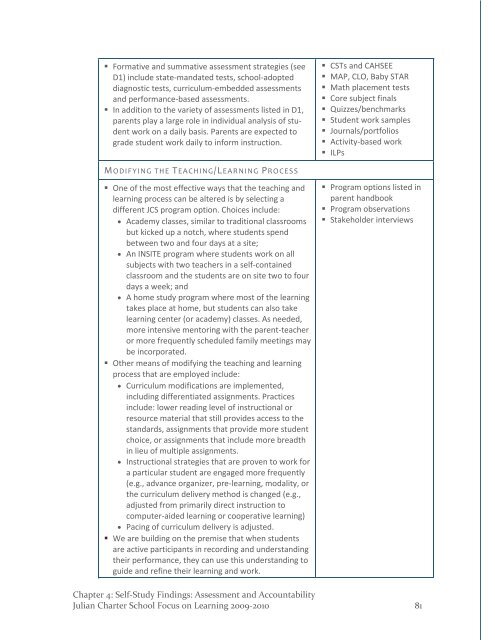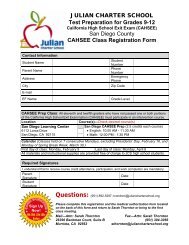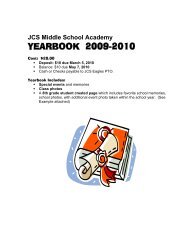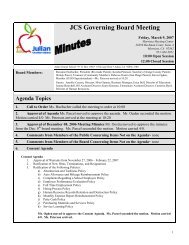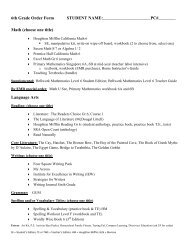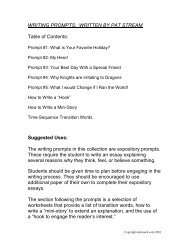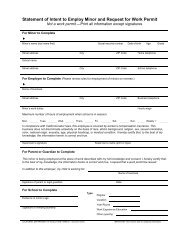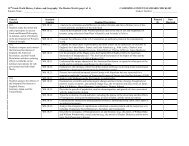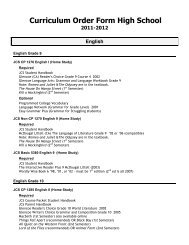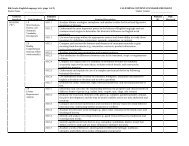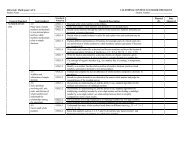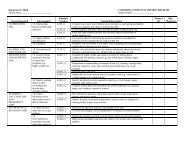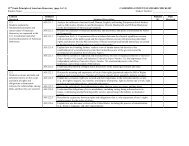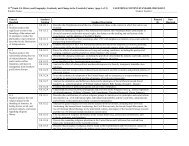2009-2010 Self-Study WASC Action Plan - Julian Charter School
2009-2010 Self-Study WASC Action Plan - Julian Charter School
2009-2010 Self-Study WASC Action Plan - Julian Charter School
Create successful ePaper yourself
Turn your PDF publications into a flip-book with our unique Google optimized e-Paper software.
• Formative and summative assessment strategies (see<br />
D1) include state-mandated tests, school-adopted<br />
diagnostic tests, curriculum-embedded assessments<br />
and performance-based assessments.<br />
• In addition to the variety of assessments listed in D1,<br />
parents play a large role in individual analysis of student<br />
work on a daily basis. Parents are expected to<br />
grade student work daily to inform instruction.<br />
• CSTs and CAHSEE<br />
• MAP, CLO, Baby STAR<br />
• Math placement tests<br />
• Core subject finals<br />
• Quizzes/benchmarks<br />
• Student work samples<br />
• Journals/portfolios<br />
• Activity-based work<br />
• ILPs<br />
MODIFYING THE T EACHING/LEARNING PROCESS<br />
• One of the most effective ways that the teaching and<br />
learning process can be altered is by selecting a<br />
different JCS program option. Choices include:<br />
• Academy classes, similar to traditional classrooms<br />
but kicked up a notch, where students spend<br />
between two and four days at a site;<br />
• An INSITE program where students work on all<br />
subjects with two teachers in a self-contained<br />
classroom and the students are on site two to four<br />
days a week; and<br />
• A home study program where most of the learning<br />
takes place at home, but students can also take<br />
learning center (or academy) classes. As needed,<br />
more intensive mentoring with the parent-teacher<br />
or more frequently scheduled family meetings may<br />
be incorporated.<br />
• Other means of modifying the teaching and learning<br />
process that are employed include:<br />
• Curriculum modifications are implemented,<br />
including differentiated assignments. Practices<br />
include: lower reading level of instructional or<br />
resource material that still provides access to the<br />
standards, assignments that provide more student<br />
choice, or assignments that include more breadth<br />
in lieu of multiple assignments.<br />
• Instructional strategies that are proven to work for<br />
a particular student are engaged more frequently<br />
(e.g., advance organizer, pre-learning, modality, or<br />
the curriculum delivery method is changed (e.g.,<br />
adjusted from primarily direct instruction to<br />
computer-aided learning or cooperative learning)<br />
• Pacing of curriculum delivery is adjusted.<br />
• We are building on the premise that when students<br />
are active participants in recording and understanding<br />
their performance, they can use this understanding to<br />
guide and refine their learning and work.<br />
• Program options listed in<br />
parent handbook<br />
• Program observations<br />
• Stakeholder interviews<br />
Chapter 4: <strong>Self</strong>-<strong>Study</strong> Findings: Assessment and Accountability<br />
<strong>Julian</strong> <strong>Charter</strong> <strong>School</strong> Focus on Learning <strong>2009</strong>-<strong>2010</strong> 81


